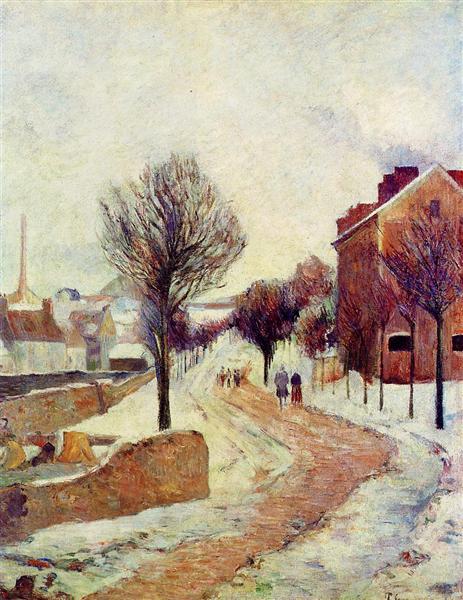תיאור
Paul Gauguin's "Suburb Under Snow" created in 1886 falls within a crucial period of the painter's artistic development, as he ventured into new forms of expression and a use of color that would later become his hallmark. This work captures a scene of a Parisian suburb enveloped in winter stillness, reflecting both the beauty and melancholy of the cityscape under a blanket of snow.
The energetic use of the colour palette, which includes shades of blue and white, succeeds in evoking the coldness of the surroundings, while the touches of warmer colours, such as yellow and orange on the buildings, offer a subtle contrast that suggests the warmth of home despite the inclement weather. The snow, depicted with a dense and almost palpable texture, not only covers the ground but acts as a unifying element in the composition, providing cohesion to the scene and adding a sense of calm and deep silence.
Compositionally, Gauguin employs a simple, orderly arrangement of houses, which line up along the horizon. The straight lines of the buildings contrast with the softness of the snowy landscape, creating a visual harmony that invites the viewer to explore the scene with their eyes. The representation of space is clear and a perspective is perceived, although this is treated in a different way than conventional ones. Instead of an illusion of depth, there is an almost two-dimensional sensation that could recall the influences that Gauguin absorbed from Japanese art, which he admired for its graphic approach.
The presence of characters in this work is almost non-existent, which enhances the feeling of solitude and stillness of the snowy suburb. The human emptiness in the scene allows the viewer to project their own thoughts and emotions onto the landscape, fostering a personal connection with the work. This intentional absence of human figures highlights an introspective approach, aligning with Gauguin’s quest to represent not only visual reality, but emotional reality as well.
"Suburb Under the Snow" marks a turning point in Gauguin's work, as he began to move away from the impressionist techniques that had characterized his early work. In this work, the painter delves into a more symbolic language of his own, which would later culminate in his famous compositions of tropical environments and exotic figures that would take him to Tahiti. The work can also be seen as a reflection on modern life, the isolation of the individual and the ephemeral beauty of nature, a recurring theme in 19th century art.
In conclusion, “Suburb Under Snow” is not only a testament to Gauguin’s unique style, but also an emotional exploration of an everyday landscape transformed by snow. The work, while it may seem simple in its subject matter, suggests a profound meditation on environment, time, and human experience, elements that would continue to resonate throughout his career and cement his legacy in the art world.
KUADROS ©, a famous painting on your wall.
Hand-made oil painting reproductions, with the quality of professional artists and the distinctive seal of KUADROS ©.
Painting reproduction service with satisfaction guarantee. If you are not completely satisfied with the replica of your painting, we will refund 100% of your money.

